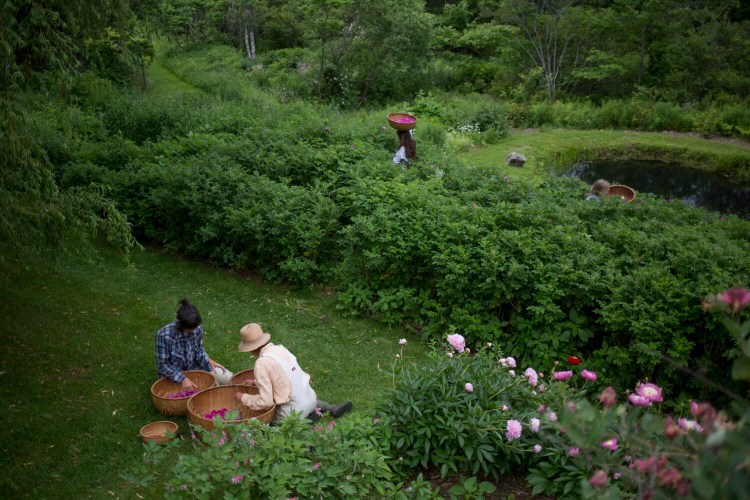Deb Soule’s new book “The Healing Garden: Herbs for Health and Wellness” to be published in April, covers just about everything Soule does at Avena Botanicals Herbal Apothecary in Rockport.
For publisher Princeton Architectural Press, the book’s key piece is its information about drying the herbs, flowers and berries that Soule grows. “I was asked specifically to write about drying herbs for smaller scale gardens,” she said in a telephone interview. “There is not much out there on that topic, and they wanted me to write a book about my experience.”
Soule succeeds in that goal, as well as the others she undertook.
On drying, she starts with the temperature that is best for drying (75-100 degrees Fahrenheit) and the describes the equipment needed, including drying screens and shelves. Her instructions get specific: Wash your hands before picking herbs or entering the drying room. Wear mask to protect the herbs – second nature during a pandemic. But also cover your hair and go barefoot. She also tells readers how to deal with rodents and pantry moths. For people who lack space for a drying room, she suggests alternatives, such as electric dehydrators and gas stoves.
The sections I enjoyed most were those on how Soule grows and harvests 16 of her most important herbs. Some, like echinacea, are common garden flowers. Others, like dandelion, are often considered weeds. One, teasel, I didn’t know existed. Soule writes about each plant’s healing qualities. She tells you how to grow and harvest it, how to dry it and use it, what it tastes like and where it comes from. What more would you need to know?
Another section is about creating herbal medicines: teas, infusions, decoctions, tinctures, oils and such, some of which she sells.
She said she wanted to share what she has learned during her career with other like-minded growers, and doubts that the information she includes will cost her much business.
Avena Botanicals is an organic farm, but it is also a biodynamic farm: it makes its compost according to strict rules, and it consults the time, date and placement of the planets to know when flowers and other parts of plants can be harvested.
Soule’s relationship with plants is spiritual. She recognizes that plants are intelligent, a belief others share. I have written about “The Hidden Life of Trees” by Peter Wohlleben and “The Revolutionary Genius of Plants” by Stefano Mancuso, which Soule said she has also read and likes, and I, too, am a believer in intelligent plants.
Soule said she spends time communing with her plants, and she asks them for permission before she harvests them. When I asked her how she knew permission had been given, she replied that I was being too literal. After calmly spending time in the garden, she said, growers should have a feeling if the time is right for picking.
In addition to communing with the plants, she recognizes that she is gardening on land that once was home to the Wabanaki tribes, and that she owes them a debt.
“The Healing Garden” is packed with almost 200 photos, all by Molly Haley of Portland. Soule and Haley met when Haley was sent to Avena to take photographs for the Maine Farmland Trust. The two got along well, so when the publisher asked if Soule whom she’d like to work with, she chose Haley.
The book was written and the photography completed before the pandemic began, but Soule and Haley spent a good part of the lockdown working on its layout. Soule thinks demand for the book will be higher because of the pandemic, when many people took up or resumed gardening. Also, the pandemic encouraged people to be more self-reliant, she said, something her book can help with.
The book’s most moving prose appears, nonchalantly, at the end of the section on teasel: four poetical paragraphs that seemed like a hidden treasure. In them she advises people to watch the light move through the garden, and to quietly walk through and around the garden, yet to respect the soil by not walking too much, thus packing it down. She writes in part:
“Dream big but start smaller than that.”
“Dance, sing, and pray in your garden. Learn to laugh and leap over beds whenever the opportunity arises.”
Tom Atwell is a freelance writer gardening in Cape Elizabeth. He can be contacted at: tomatwell@me.com.
Send questions/comments to the editors.




Comments are no longer available on this story